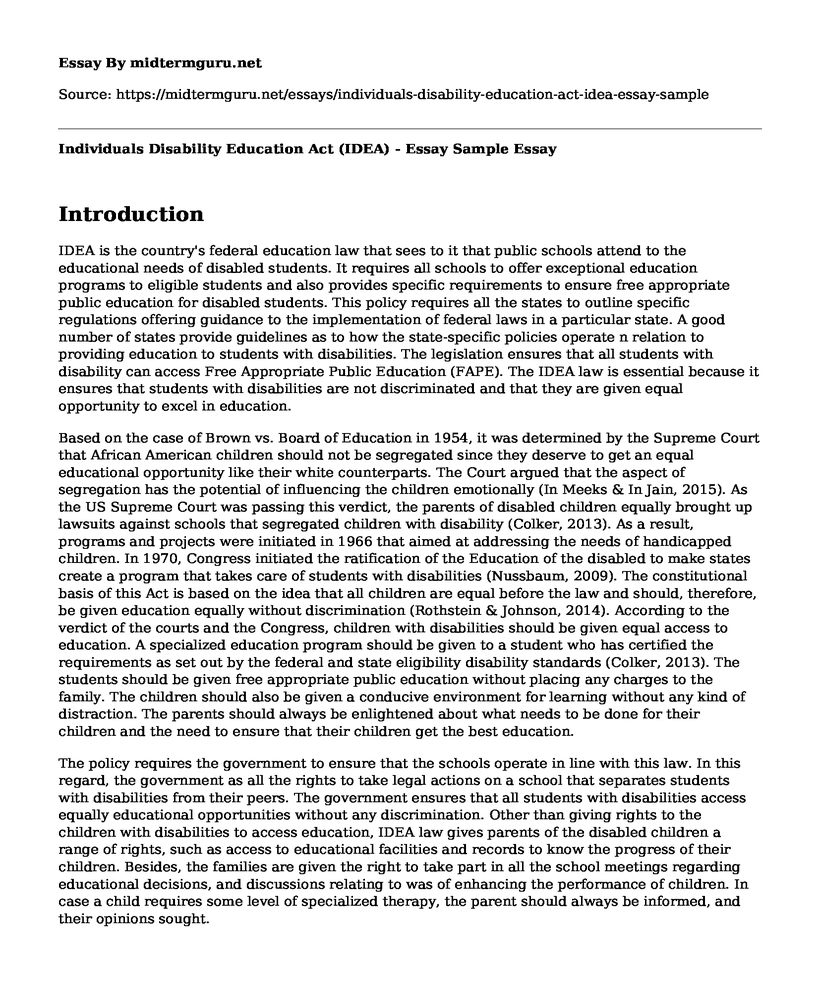Introduction
IDEA is the country's federal education law that sees to it that public schools attend to the educational needs of disabled students. It requires all schools to offer exceptional education programs to eligible students and also provides specific requirements to ensure free appropriate public education for disabled students. This policy requires all the states to outline specific regulations offering guidance to the implementation of federal laws in a particular state. A good number of states provide guidelines as to how the state-specific policies operate n relation to providing education to students with disabilities. The legislation ensures that all students with disability can access Free Appropriate Public Education (FAPE). The IDEA law is essential because it ensures that students with disabilities are not discriminated and that they are given equal opportunity to excel in education.
Based on the case of Brown vs. Board of Education in 1954, it was determined by the Supreme Court that African American children should not be segregated since they deserve to get an equal educational opportunity like their white counterparts. The Court argued that the aspect of segregation has the potential of influencing the children emotionally (In Meeks & In Jain, 2015). As the US Supreme Court was passing this verdict, the parents of disabled children equally brought up lawsuits against schools that segregated children with disability (Colker, 2013). As a result, programs and projects were initiated in 1966 that aimed at addressing the needs of handicapped children. In 1970, Congress initiated the ratification of the Education of the disabled to make states create a program that takes care of students with disabilities (Nussbaum, 2009). The constitutional basis of this Act is based on the idea that all children are equal before the law and should, therefore, be given education equally without discrimination (Rothstein & Johnson, 2014). According to the verdict of the courts and the Congress, children with disabilities should be given equal access to education. A specialized education program should be given to a student who has certified the requirements as set out by the federal and state eligibility disability standards (Colker, 2013). The students should be given free appropriate public education without placing any charges to the family. The children should also be given a conducive environment for learning without any kind of distraction. The parents should always be enlightened about what needs to be done for their children and the need to ensure that their children get the best education.
The policy requires the government to ensure that the schools operate in line with this law. In this regard, the government as all the rights to take legal actions on a school that separates students with disabilities from their peers. The government ensures that all students with disabilities access equally educational opportunities without any discrimination. Other than giving rights to the children with disabilities to access education, IDEA law gives parents of the disabled children a range of rights, such as access to educational facilities and records to know the progress of their children. Besides, the families are given the right to take part in all the school meetings regarding educational decisions, and discussions relating to was of enhancing the performance of children. In case a child requires some level of specialized therapy, the parent should always be informed, and their opinions sought.
References
Black, D. W., (2016). Education law: Equality, fairness, and reform. New York: Wolters Kluwer.
Colker, R., (2013). Disabled education: A critical analysis of the Individuals with Disabilities Education Act. New York: New York University Press.
In Meeks, L. M., & In Jain, N. R. (2015). The guide to assisting students with disabilities: Equal access in health science and professional education. New York: Springer Publishing Company.
Nussbaum, M. C., (2009). Frontiers of Justice: Disability, Nationality, Species Membership. Cambridge: Harvard University Press.
Rothstein, L. F., & Johnson, S. F. (2014). Special education law. Thousand Oaks, California: SAGE Publications.
Superfine, B. M., (2014). Equality in education law and policy, 1954-2010. New York: Cambridge University Press.
Superfine, B. M., (2013). Equality in education law and policy, 1954-2010.Terzi, L., (2010). Justice and equality in education: A capability perspective on disability and special educational needs. New York Continuum.
Cite this page
Individuals Disability Education Act (IDEA) - Essay Sample. (2023, Jan 15). Retrieved from https://midtermguru.com/essays/individuals-disability-education-act-idea-essay-sample
If you are the original author of this essay and no longer wish to have it published on the midtermguru.com website, please click below to request its removal:
- Characterization of a New Epidemic in Montana - Public Health Paper Example
- Reflective Diary and Report on the Work in Southend Borough Council - Paper Example
- Essay on Fast Food and Child Obesity
- How I Made the Most Out of the Opportunities I Have Come Across in My Life So Far?
- 19th Century Political Ideologies: Liberalism, Conservatism, Socialism & Nationalism - Essay Sample
- Building Positive Relationships Through State Coercion - Essay Sample
- Paper Example on Adoption in LGBT Families







